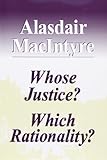Found in 2 comments on Hacker News
fecklessyouth · 2015-08-10
· Original
thread
Anyone interested in the necessity of understanding history for philosophical and moral thinking ought to read MacIntyre's Whose Justice, Which Rationality. It argues that a "history-constituted tradition" is the inevitable system in which we make intellectual progress, and analyses the major movements in philosophy as support.
http://www.amazon.com/Whose-Justice-Rationality-Alasdair-Mac...


The mere presence of debate does not preclude certainty about overarching principles. Various denominations might disagree about what's moral in a situation, but they can at least agree about why this specific kind of morality is important, and what reasoning and evidence should be relevant in the discussion, and how this morality plays into a larger conception of the Christian life. Elements like the Gospel, the Apostle's Creed, and the metaphysics of traditional deism can all be harnessed to conduct and resolve debate. There are more certainties than there are the opposite. And perfect certainty will never be achieved, even on a theological level. Since one of the charges of theology is to adapt and present Christianity to a changing world.
Unlike, say, secular moral discourse, especially manifest in political speech, which makes no effort whatsoever to establish shared principles. There are few, if any, first premises which can initiate debate. There are few agreed-upon standards for what counts as relevant evidence, or how certain values outweigh others.
Wading in secular moral philosophy, the situation becomes even more dire. No one could ever hope to walk into a secular philosophy class with modern material and achieve any guidance about how to conduct their life.
The ability to debate and resolve issues is the marker of a healthy tradition. Not all issues can be resolved. But there should at least be a vehicle to coming to the best available answer. Studying, say, the progression of Catholic theological doctrine is a good example of this. But in our post-Reformation era, in which every theological debate ends up spawning a new Protestant denomination, your lack of confidence is understandable.
I do, of course, agree with you that our broader cultural approach to such issues is entirely arbitrary and resistant to intellectual progress.
Edit: Alasdair MacIntyre's Whose Justice, Which Rationality is a stellar treatment of this problem you're noticing:
http://www.amazon.com/Whose-Justice-Rationality-Alasdair-Mac...